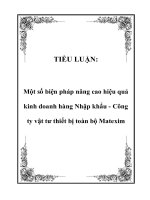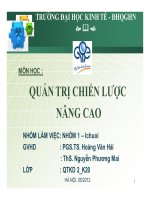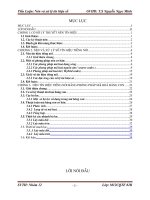tiểu luận Giải tích máy điện nâng cao
Bạn đang xem bản rút gọn của tài liệu. Xem và tải ngay bản đầy đủ của tài liệu tại đây (2.74 MB, 22 trang )
BỘ CÔNG THƯƠNG
TRƯỜNG ĐH CÔNG NGHIỆP THỰC PHẨM TP. HCM
BÀI TIỂU LUẬN:
GIẢI TÍCH MÁY ĐIỆN NÂNG CAO
GVHD: TS. Phan Xuân Lễ
Thực hiện: Lê Thành Trí
TP. Hồ Chí Minh, năm 2019
Câu 1:
A three-phase, 460V, 60Hz, eight-pole induction machine is driven by a wind
turbine. The induction machine has the following parameters:
R1 0.015
;
R�
0.035 L 1 0.385mH L �
0.385mH L m 17,24mH
2
2
;
;
;
The induction machine is connected to a 460V infinite bus through a feeder
having a resistance of 0.01 and an inductance of 0.08 mH. The wind turbine
drives the induction machine at slip of -0.5%.
a) Determine the speed of the wind turbine:
60 f
60.60
n (1 s).
(1 (0.005)).
904.5(rpm)
p
4
b) Determine the voltage at the terminals of the induction machine:
The equivalent circuit of the induction machine:
j 6.5 7 j 0.145
0.01 j 0.03 0.015 j 0.145
j 6.5 7 j 0.145
4.83а 130.7 ( )
460
Vs
3
I1
54.99� 130.7�(A)
Z 4.83а 130.7
The voltage at the terminals of the induction machine:
460
54.99� 130.7��
0.01 j0.03
3
=268.57� 60.63�(V)
Vt Vs I1Z line
c) Determine the power delivered to the infinite bus and the power factor:
Power delivered to the infinite bus:
Ps 3 �Vs �I1 cos
3 �Vs �I1 cos( 0 ( 130.7o )
3 �268.57 �54.99 � 0.652 =-28.89(KW)
d) Determine the efficiency of the system:
Pag Ps 3I12 0.01 0.015 29.116 (KW)
Pmech 1 s Pag 1 0.005 �29.116 29.26 (KW)
Assume the rotational and core losses to be 3KW
� Prot 3 (KW)
� Pshaft Pmech Prot 29.26 3 32.26 (KW)
Ps
28.89
0.89
Pshaft 32.26
The efficiency of the system is 89%
Câu 2:
Ứng dụng simulink trên matlab xây dựng mô phỏng theo Fugure 2.11
1. Xây dựng mơ hình
Figure 2.11 Simulation of series resonant circuit
File m4.m
R = 12; %R in ohms
L = 0.231e-3; %L in H
C = 0.1082251e-6;%C in Farad
wo = sqrt(1/(L*C)) % series resonant frequency in
rad/sec
Vdc = 100; % magnitude of ac voltage = Vdc Volts
iLo = 0; % initial value of inductor current
vCo = 0; % initial voltage of capacitor voltage
tf = 10*(2*pi/wo); % filter time constant
tstop = 25e-4; % stop time for simulation
% set up time and output arrays of repeating sequence
for Pref
Pref_time = [ 0 6e-4 11e-4 11e-4 18e-4 18e-4 tstop ];
Pref_value = [ 0 600 600 300 300 600 600 ];
% determine steadystate characteristics of RLC
circuit
we = (0.5*wo: 0.01*wo: 1.5*wo);% set up freq range
wind = 0 % index for w loop
for w = we; % w for loop to compute admittance
wind = wind + 1;
Y(wind) = 1/(R + j*w*L + 1/(j*w*C));
Irms = (4*Vdc/(pi*sqrt(2)))*abs(Y(wind)); % rms value
of i
PR(wind)= Irms*Irms*R;
end; % for w
% plot circuit characteristics
clf;
subplot(2,1,1)
plot(we,abs(Y));
xlabel('frequency in rad/sec');
ylabel('admittance in mhos');
subplot(2,1,2)
plot(we,PR);
xlabel('frequency in rad/sec');
ylabel('power in watts');
disp('run simulation, type ''return'' when ready to
continue')
keyboard
clf
subplot(4,1,1)
plot(y(:,1),y(:,2))
title('excitation voltage')
ylabel('Vs in V')
subplot(4,1,2)
plot(y(:,1),y(:,3))
title('load power')
ylabel('PR in W')
subplot(4,1,3)
plot(y(:,1),y(:,4))
title('RLC current')
ylabel('i in A')
subplot(4,1,4)
plot(y(:,1),y(:,5))
xlabel('time in sec')
title('capacitor voltage')
ylabel('VC in V')
2. Kết quả mô phỏng
Figure 2.12 Admittance and power absorbed of series RLC circuit
Figure 2.13 Responses to changes in the reference power command
Kết quả mô phỏng từ Simulink:
3. Trình tự thực hiện và nội dung mơ phỏng
a) Trình tự thực hiện
- Xây dựng các khối
Khối
có được khi khai báo trong file m4.m và run file m4.m.
- Kết
nối các khối theo figure 2.11
- Xây dựng file m4.m
b) Nội dung mô phỏng: Figure 2.11 mô phỏng mạch cộng hưởng RLC mắc nối
tiếp
- Run file m4.m sẽ có figure 2.12: sơ đồ tổng dẫn và năng lượng của mạch
RLC nối tiếp. Tắt figure 2.12
- Run again file m4.m sẽ có figure 2.13: sơ đồ đáp ứng những thay đổi trong
công suất tham chiếu
- Run file simulink sẽ có sơ đồ đáp ứng những thay đổi trong công suất tham
chiếu.
Câu 3:
Ứng dụng simulink trên matlab xây dựng mô phỏng theo Fugure 6.39
1. Xây dựng mơ hình Figure 6.39
File m6.m
% M file for Project 6 on single-phase induction
motor
% in Chapter 6. It sets the machine parameters and
% also plots the simulated results when used in
conjunction
% with SIMULINK file s6.m.
clear all % clear workspace
% select machine parameter file to enter into Matlab
workspace
disp('Enter filename of machine parameter file
without .m')
disp('Example: psph')
setX = input('Input machine parameter filename >
','s')% string s
eval(setX); % evaluate MATLAB command
% Calculation of torque speed curve
Vqs = Vrated + j*0; % rms phasor voltage of main wdg
Vpds = Nq2Nd*(Vrated + j*0);% rms aux wdg voltage
referred to main wdg
T = (1/sqrt(2))*[ 1 -j; 1 j ]; % transformation
V12 = T*[Vqs; Vpds];% transforming qsds to sequence
disp('Select with or without capacitor option')
opt_cap = menu('Machine type? ','No capacitor','With
start capacitor only','With start and run capacitor')
if (opt_cap == 1) % Split-phase machine, no capacitor
disp(' Split-phase machine')
zpcstart = 0 +j*eps; % zcrun referred to main wdg
zpcrun = 0 +j*eps; % zcrun referred to main wdg
zC = zpcstart;
Capstart = 0; % set flag
Caprun = 0; % set flag
wrswbywb = we; % cutoff speed to disconnect start
cpacitor
end % if
if (opt_cap == 2) % Capacitor-start machine
disp(' Capacitor-start machine')
zpcstart = (Nq2Nd^2)*zcstart; % zcrun referred to
main wdg
zpcrun = 0 +j*eps; % zcrun referred to main wdg
zC = zpcstart;
Capstart = 1; % set flag
Caprun = 0; % set flag
wrswbywb = 0.75; % rotor speed to disconnect start
cpacitor
end % if
if (opt_cap == 3) % Capacitor-run machine
disp(' Capacitor-run machine')
zpcstart = (Nq2Nd^2)*zcstart; % zcrun referred to
main wdg
zpcrun = (Nq2Nd^2)*zcrun; % zcrun referred to main
wdg
zC = zpcrun;
Capstart = 0; % set flag
Caprun = 1; % set flag
wrswbywb = 0.75; % rotor speed to changeover from
start to run
end % if
Rcrun = real(zpcrun); % referred resistance of run
capacitor
Xcrun = imag(zpcrun); % referred reactance of run
capacitor
Crun = -1/(wb*Xcrun); % referred capacitance of run
capacitor
Rcstart = real(zpcstart); % referred resistance of
start capacitor
Xcstart = imag(zpcstart); % referred reactance of run
capacitor
Cstart = -1/(wb*Xcstart); % referred capacitance of
start capacitor
% network parameters of positive and negative
sequence circuit
zqs = rqs + j*xlqs; % self impedance of main wdg
zcross = 0.5*(rpds + real(zC) - rqs) + j*0.5*(xplds +
imag(zC) - xlqs);
%set up vector of slip values
s = (1:-0.02:0);
N=length(s);
for n=1:N
s1 = s(n); % positive sequence slip
s2 = 2-s(n); % negative sequence slip
wr(n)=2*we*(1-s1)/P; % rotor speed in mechanical
rad/sec
if abs(s1) < eps; s1 = eps; end;
zp1r = rpr/s1 + j*xplr;
z1s= j*xmq*zp1r/(zp1r + j*xmq);
if abs(s2)< eps; s2 = eps; end;
zp2r = rpr/s2 + j*xplr;
z2s= j*xmq*zp2r/(zp2r + j*xmq);
z11 = zqs + z1s + zcross;
z22 = zqs + z2s + zcross;
zmat = [ z11 -zcross; -zcross z22 ];
I12 = inv(zmat)*V12;
I1s = I12(1);
I2s = I12(2);
Iqd = inv(T)*[I1s; I2s];
Sin =[Vqs Vpds]*conj(Iqd);
Pin = real(Sin);
angIq(n) =angle(Iqd(1))*180/pi;
angId(n) =angle(Iqd(2))*180/pi;
magIq(n) =abs(Iqd(1));
magId(n) =abs(Iqd(2));
Ip1r = -j*xmq*I1s/(zp1r + j*xmq);
Ip2r = -j*xmq*I2s/(zp2r + j*xmq);
Tavg(n)=(P/(2*we))*(abs(Ip1r)^2*rpr/s1 abs(Ip2r)^2*rpr/s2);
Pavg(n)=Tavg(n)*wr(n);
if abs(Pin) < eps; Pin = eps; end;
eff(n)=100*Pavg(n)/Pin;
end % n for loop
N=size(wr);
subplot(3,2,1)
plot(wr,Tavg,'-')
xlabel('Rotor speed in rad/sec')
ylabel('Torque in Nm')
subplot(3,2,2)
plot(wr,Pavg,'-')
xlabel('Rotor speed in rad/sec')
ylabel('Developed power in Watts')
subplot(3,2,3)
plot(wr,magIq,'-')
xlabel('Rotor speed in rad/sec')
ylabel('|Iqs| in A')
subplot(3,2,4)
plot(wr,magId,'-')
xlabel('Rotor speed in rad/sec')
ylabel('|Ipds| in A')
subplot(3,2,5)
plot(wr,eff,'-')
xlabel('Rotor speed in rad/sec')
ylabel('Efficiency in percent')
subplot(3,2,6)
plot(wr,angIq,'-')
hold on
plot(wr,angId,'-.')
xlabel('Rotor speed in rad/sec')
ylabel('Iqs and Ipds angle in degree')
hold off
disp('Displaying steady-state characteristics ')
fprintf('Referred capacitor impedance is %.4g %.4gj
Ohms\n', real(zC), imag(zC))
disp('type ''return'' to proceed on with
simulation');
keyboard
% Transfer to keyboard for simulation
disp('Select loading during run up')
opt_load = menu('Loading? ','No-load','With step
changes in loading')
% setting all initial conditions in SIMULINK
simulation to zero
Psiqso = 0;
Psipdso = 0;
Psipqro = 0;
Psipdro = 0;
wrbywbo = 0; % initial pu rotor speed
% set up repeating sequence Tmech signal
if (opt_load == 1) % No-load
tstop = 2; % simulation run time
tmech_time =[0 tstop];
tmech_value =[0 0];
end
if (opt_load == 2) % Step changes in loading
tstop = 2.5; % simulation run time
tmech_time =[0 1.5 1.5 1.75 1.75 2.0 2.0 2.25 2.25
2.5];
tmech_value =[0 0 -Tb -Tb -Tb/2 -Tb/2 -Tb -Tb 0 0 ];
end
disp('Set for simulation to start from standstill and
')
disp('load cycling at fixed frequency,')
disp('return for plots after simulation by typing ''
return''');
keyboard
% Convert referred values back to actual
Vds = y(:,3)/Nq2Nd;
Ids = y(:,8)*Nq2Nd;
Vcap = y(:,4)/Nq2Nd;
Psids = y(:,7)/Nq2Nd;
disp('Plot results in two figure windows')
h1=gcf;
subplot(5,1,1)
plot(y(:,1),y(:,2),'-')
ylabel('Vqs in V')
subplot(5,1,2)
plot(y(:,1),Vds,'-')
ylabel('Vds in V')
subplot(5,1,3)
plot(y(:,1),y(:,9),'-')
axis([-inf inf -1 1])
ylabel('Tmech in Nm')
subplot(5,1,4)
plot(y(:,1),y(:,10),'-')
ylabel('Tem in Nm')
subplot(5,1,5)
plot(y(:,1),y(:,11),'-')
xlabel('Time in sec')
ylabel('wr/wb in pu')
h2=figure;
subplot(5,1,1)
plot(y(:,1),Vcap,'-')
ylabel('Vcap in V')
subplot(5,1,2)
plot(y(:,1),y(:,5),'-')
ylabel('Psiqs in V')
subplot(5,1,3)
plot(y(:,1),y(:,6),'-')
ylabel('Iqs in A')
subplot(5,1,4)
plot(y(:,1),Psids,'-')
ylabel('Psids in V')
subplot(5,1,5)
plot(y(:,1),Ids,'-')
xlabel('Time in sec')
ylabel('Ids in A')
disp('Save plots in Figs. 1, and 2')
disp('before typing return to exit');
keyboard;
close(h2);
File psph.m
% Parameters of single-phase induction motor for
Project 6 of Chapter 6
Sb = 186.5; % 1/4 hp rating in VA
Prated = 186.5; % 1/4 hp output power in W
Vrated = 110;
% rated rms voltage in V
P = 4;
% number of poles
frated = 60;
% rated frequency in Hz
wb = 2*pi*frated;% base electrical frequency
we = wb;
wbm = 2*wb/P;
% base mechanical frequency
Tb = Sb/wbm;
% base torque
Zb = Vrated*Vrated/Sb; %base impedance in ohms
Vm = Vrated*sqrt(2);
% magnitude of phase voltage
Vb = Vm; % base rms voltage
Tfactor = P/(2*wb); % torque expression coefficient
% 1/4 hp, 4 pole, 110 volts capacitor start,
capacitor run,
% single-phase induction motor parameters in
engineering units from
%
% Krause, P. C. , "Simulation of Unsymmetrical
Induction
% Machinery," IEEE Trans. on Power Apparatus,
% Vol.PAS-84, No.11, November 1965.
% Copyright 1965 IEEE
Nq2Nd = 1/1.18; % Nqs/Nds main to aux wdg turns ratio
rqs = 2.02; % main wdg resistance
xlqs = 2.79;
% main leakage reactance
rds = 7.14;
% aux wdg resistance
xlds = 3.22;
% aux leakage reactance
rpds=(Nq2Nd^2)*rds;% aux wdg resistance referred to
main wdg
xplds=(Nq2Nd^2)*xlds;% aux wdg leakage reactance
referred to main wdg
xplr = 2.12;
% rotor leakage reactance referred to
main wdg
rpr = 4.12; % rotor wdg resistance referred to main
wdg
xmq = 66.8; % magnetizing reactance referred to main
wdg
xMq = 1/(1/xmq + 1/xlqs + 1/xplr);
xMd = 1/(1/xmq + 1/xplds + 1/xplr);
J = 1.46e-2;
% rotor inertia in kg m2
H = J*wbm*wbm/(2*Sb); % rotor inertia constant in
secs.
Domega = 0; % rotor damping coefficent
zcstart = 3 - j*14.5; % starting capacitor in Ohms
zcrun = 9 - j*172; % running capacitor in Ohms
wrsw = 0.75*wb; % rotor speed to change over from
start to run in rev/min
2. Kết quả mô phỏng
Figure 6.40 Steady-state characteristics of ¼-hp split-phase moto
Figure 6.41 Startup and load response of ¼-hp split-phase moto
Figure 6.42 Startup and load response of ¼-hp split-phase moto
Figure 6.43 Steady-state characteristics of ¼-hp capacitor-start motor
Figure 6.44 Startup and load response of ¼-hp capacitor-start motor
Figure 6.45 Startup and load response of ¼-hp capacitor-start motor
Figure 6.46 Steady-state characteristics of ¼-hp capacitor-run motor
Figure 6.47 Startup and load response of ¼-hp capacitor- run motor
Figure 6.48 Startup and load response of ¼-hp capacitor- run motor
3. Trình tự thực hiện và nội dung mơ phỏng
a) Trình tự thực hiện
- Xây dựng các khối ExtConn, Qaxis, Daxis, Rotor
Khối ExtConn
Khối Qaxis
Khối Daxis
Khối Rotor
b)
Kết nối các khối theo figure 6.39.
Xây dựng file m6.m.
Xây dựng file psph.m.
Nội dung mơ phỏng
Run ¼-hp split-phase moto
- Run file m6.m, cửa sổ Command Window thông báo :
Enter filename of machine parameter file without .m
Example: psph
-
-
-
-
-
Input machine parameter filename >
Nhập psph, chọn No cacpacitor trong Machine type sẽ được figure 4.60.
Cửa sổ Command Window, nhập K>> return.
Run file s6.m, run file simulink, run again file m6.m sẽ được figure 4.61 và
figure 4.62.
Run ¼-hp capacitor-start motor
Run file m6.m, cửa sổ Command Window thông báo :
Enter filename of machine parameter file without .m
Example: psph
Input machine parameter filename >
Nhập psph, chọn With start cacpacitor only trong Machine type sẽ được
figure 4.63
Cửa sổ Command Window, nhập K>> return.
Run file s6.m, run file simulink, run again file m6.m sẽ được figure 4.64 và
figure 4.65.
Run ¼-hp capacitor- run motor
Run file m6.m, cửa sổ Command Window thông báo :
Enter filename of machine parameter file without .m
Example: psph
Input machine parameter filename >
Nhập psph, chọn With start and run cacpacitor trong Machine type sẽ được
figure 4.66
Cửa sổ Command Window, nhập K>> return.
Run file s6.m, run file simulink, run again file m6.m sẽ được figure 4.67 và
figure 4.68.









